- Home
- Neal Shusterman
Everwild s-2 Page 14
Everwild s-2 Read online
Page 14
Later that day, in a Memphis church, Kevin David Barnes, twenty-four, married Rebecca Lynn Danbury, twenty-two. The groom, a bit scruffy in real life, was quite handsome in his tuxedo, and everyone agreed the bride was the most perfect vision of a bride that anyone had ever seen.
When the minister said those momentous words to conclude the glorious ceremony, Kevin Barnes lifted his new wife's veil to give her that long-awaited kiss. He had no way of knowing that Allie was secretly hiding behind the bride's wild, racing thoughts-not stealing the moment, but lurking within it, hoping to claim the tiniest fraction of it for herself. When the kiss ended, Allie found her spirit bursting into tears. She cried for Mikey, the boy she had lost, for Milos, the boy she had shunned, and she cried because she knew that this moment was someone else's, and she'd never grow to be twenty-two like Rebecca Lynn Danbury. She'd never go to a prom, or walk down the aisle, or be a mother. She was an Afterlight, and Afterlights knew no such things.
Although Allie tried to contain herself, her emotions touched the bride, making her cry as well. And the crowd applauded, so very pleased to see the bride's tears of joy. In her book Tips for Taps, Mary attempts to shed some of her own personal light on Afterlights who suffer from negative emotions.
"Surely sorrow will accompany any Afterlight when they cross from the so-called living world into Everlost-much the way a baby will cry upon being born. This is only natural. However, the healthy Afterlight will quickly put such negative emotions aside, lest they fester into anger or bitterness. I have seen the ravages of bitterness, and it is not pretty.
In Everlost, we have a responsibility to find happiness, and relive that same happiness day after day until eternity finds us filled with joy, and void of anything else whatsoever."
CHAPTER 15 The Flight of Mikey McGill
Mikey McGill remembered the fateful day he first awoke in Everlost, more than a hundred years ago, when he arrived home with his sister, and realized that they were ghosts. He remembered sinking through the wooden floor, while his sister clung to a bedpost screaming. Neither of them yet understood anything about Everlost, and both were terrified.
But nothing he ever experienced in life, or in death, half compared to what he felt when he saw Milos and Allie kiss.
He had followed them to the party. Until that night, Mikey had resisted the urge to spy on the two of them, but there was only so long he could fight his own curiosity. He kept far behind them, out of view, until seeing them skinjack that disgustingly beautiful couple. Once the two were ensconced in flesh, their eyes would see only the living world, and so Mikey could come right up to them, just inches away, and see it all, without them ever knowing he was there. To Mikey, they now just looked like a living teenage couple, but he knew Milos and Allie were inside them. He could tell by the way they walked and the things they said to each other.
He was there when Milos asked her to dance, and he witnessed Allie's initial reluctance-which gave him a brief moment of hope… but she gave in far too easily, as if her refusal was nothing more than her being coy.
He watched them dance. He watched them dance close, and then he followed them outside to the pool, where it seemed everyone was a couple.
And then they kissed.
The first kiss was horrifying, and the second was devastating-because it wasn't Milos shoving his lips against Allie anymore-the second kiss was Allie kissing him back. This confirmed everything he suspected, everything he feared-and what made Mikey even more furious was that he had trusted her. How could he have been so stupid?
He screamed at them, a primal wordless howl, but they couldn't hear him.
Mikey knew what he would do to Milos once he was back in Everlost-he would push Milos right through that pool deck so hard, he would have made an express trip to the center of the earth, but Mikey knew if he let his fury loose, once he was done with Milos, he would turn his wrath on Allie, and do the same to her. He couldn't let that happen, and so he ran.
He never saw Allie pushing Milos away.
He never heard her tell him "no."
Mikey's grief and rage was unbearable, and yet familiar- so much like the rage that filled him when he commanded the Sulphur Queen. And as he ran, he let his fury transform him.
His rage became red-hot spikes erupting from his skin. His frustration became jagged shark teeth, multiplying row after row, and when his mouth couldn't fit them anymore, it stretched. His jealousy pulled his eyes into narrow glaring slits, and his sorrow hardened his Afterlight skin into a shell as hard as steel.
Spiked armor encased him now, his whole body was like the surface of a medieval mace-but it didn't slow him down. His armored shell thundered with each footfall, setting off seismic ripples in the living world that no one could account for. And, fully encased in that armored exoskeleton, he stormed all the way back to Nashville, right into the factory, and the den of Nashville Afterlights.
When they saw this thing, this horrible miscreation before them, they didn't know what to do. Some scattered, others froze in place, others fell to the ground and covered their heads like the world was ending.
Mikey opened his mouth to speak, but no words came out. Instead, he vomited his entire being out through that gaping mouth, completely turning himself inside out. The armor folded in behind him, and into him, becoming a jagged skeleton within a veiny, sinewy inner self-a mockery of ruined flesh. His whole body was now an open wound.
"I am the McGill!" he roared in a ghastly, earthshaking voice. "I am the McGill! Look upon me and tremble!"
And they did.
184
185
PART THREE The Great White City In her book Everything Mary Says Is Wrong, Allie the Outcast takes a moment to ponder the hereafter:
"I don't know whether we come to Everlost by accident or by design. Some will say we are abandoned here-lost between the cracks of an unfeeling universe. Others will say we have been selected to be here by an almighty hand, and then they will use that to justify everything they do as God's will.
Whether my ability to skinjack is an accident or intentional, I do know this: I've seen the light at the end of the tunnel, so I know the universe is not cold. I've read the fortunes; they are evidence that we are not alone. And I've seen Afterlights hold their coins, remember who they once were, and finally get where they were going.
I have seen enough to know that there is something beyond Everlost, but the nature of it is just as mysterious here as it is to the living.
So beware those in Everlost who say they know God's will, because they are no different from those who say the universe is soulless and cold. Both are two sides of the same coin, and it's not a coin that will get you anywhere you want to go."
CHAPTER 16 Mary's Master Plan
It would be untrue to say that Mary Hightower had, from the very beginning, planned the various things she would soon accomplish, and the many things she would soon attempt. Ideas take root, plans blossom, and old ones wither and die-in Everlost, just as in the living world.
Back in her days at the towers, Mary had dedicated herself to taking stray Afterlights under her wing, and finding for them the one activity that would occupy them until the end of time. She believed this to be a noble calling. Nick, however, had dazzled her children with those abominable coins, then dispatched them all into that mysterious light at the end of the tunnel, from which there is no return.
She could not blame the children, for what child could resist such a mystery? It was all Nick's pigheaded wrongmindedness, and she marveled at how much damage a single individual could do to her controlled, perfect little universe.
She hated him with a ferocity and passion that was only matched by how much she also loved him-and the endless conflict of those two emotions made it impossible to go back to the way things were before. She supposed in some ways, she owed Nick a debt of gratitude, because if he hadn't freed her children from Everlost, Mary would never have been rousted out of her own pattern; she never would have seen the
larger picture, and she never would have cultivated grander plans.
Certainly she would still gather and protect as many Afterlights as she could, but that would soon become a small part of a master blueprint so massive, it would make Mary light-headed every time she was to think of it.
When she came to Chicago, however, the plan was still merely an inkling-a seedling just beginning to sprout something green. She had yet to realize how deep the roots would take, and how large the limbs would grow.
CHAPTER 17 The Death Boss
Mary allowed her reputation to precede her. In fact, she pushed it ahead of her with a mighty hand. As the Hindenburg cut a slow path across the sky, she would send out emissaries ahead of her, with copies of her various books. Then those emissaries would strategically spread stories about her to any Afterlights who would listen-which was just about everyone, for Afterlights all love the telling of stories. Mary's disciples would spread tales of wonder, and proudly tell the stories of Mary's many good deeds. If the stories themselves didn't leave kids gaping in awe, the sight of the massive airship descending from the sky certainly would.
Because Mary had a high regard for honesty, she insisted that they be told only that which was true. Of course she handchose her emissaries of good will, selecting loyal Afterlights who would portray her in the most favorable light.
Mary's emissaries arrived in Chicago several weeks before she did, and so, by the time the Hindenburg came in over Lake Michigan, there was not an Afterlight in all of Chicago who had not heard her name and didn't wonder if the stories were true.
Mary had Speedo circle the city three times so every Afterlight below would have a clear view of it. Speedo was clearly apprehensive.
"Are you sure you want to do this?" Speedo asked her. He had asked this over and over again, as if asking might get her to change her mind. "There's got to be a reason why the kids we sent out never came back."
"We'll discover the reason soon enough."
On the second loop above the city, Mary decided where they'd set down. It was a city full of deadspots, thanks to the great Chicago fire-but one place stood out. Mary recognized it as the grounds of the 1893 Columbian Exhibition-a giant world's fair. It was more than a mile across-the largest deadspot Mary had ever seen-and even from this height, Mary could see it was quite literally swarming with Afterlights.
"There," said Mary, pointing at the largest square, in the center of the fairgrounds. "That's where we'll set down."
Speedo quaked in his wet bathing suit. "But shouldn't we land somewhere away from the city? Far, far away?"
"No, Speedo," Mary said calmly. "This time, I want to be right in the thick of it."
Their standard operating procedure had always been to settle in less populated areas, set up their various soul traps, then return sometime later to see if the traps had sprung. Then, as the population within the Hindenburg grew, she became slightly more daring, setting down in small towns and villages that might have some rudimentary organization to their Afterlight population.
She would address the small gatherings of Afterlights in these towns. Sometimes they would join her, and climb aboard, sometimes not. If they chose not to join her, she would leave them with whatever gifts she could spare, and the nagging feeling that they missed out on something wonderful. By the time she came to Chicago, she had ninety-three Afterlights in her protective care.
"The city's run by a Death Boss!" said Speedo. "That's what he calls himself! A Death Boss!"
"Just a rumor," Mary said, although she suspected that the rumor was true. She had heard that he even named himself after the city's most notorious gangster. "Last month you were telling me that Chicago didn't even exist!"
"I didn't say that," said Speedo. "I said that it didn't exist in Everlost."
"And yet now we know that it does," Mary pointed out. "Illumination defeats ignorance every time."
"What if he captures us and turns us into slaves?" pleaded Speedo. "Then what?"
"Dictators who rule with an iron fist are motivated by self-interest," Mary lectured, "and if Pugsy Capone does rule like a dictator, it would not serve his interests to enslave us."
"Are you sure of that?"
Mary sighed. "No," she admitted. "But we're going anyway."
They circled the city a final time, then descended toward the grounds of the Columbian Exhibition.***
The World Columbian Exhibition of 1893 was perhaps the greatest world's fair there had ever been. It filled a full square-mile along the shore of Lake Michigan, and looked more like Ancient Rome than Chicago. Magnificent domed buildings, column-lined courtyards, and glorious fountains stood at the heart of the fair, all of it so alabaster white it became known as the Great White City-blinding in the sun, and glowing mystically by moonlight. These towering colonnades and hallowed halls of industry stood as monuments to the power and permanence of man's creations.
Unfortunately it was all made of cheap plaster, and crumbled like a sandcastle once the fair was over.
However, the loss to the living world was a gift to Everlost. Here in Everlost, the Great White City still claimed the shoreline of Lake Michigan. The gilded Statue of the Republic forever towered resolutely at its heart, and George Ferris's great wheel-the original Ferris wheel-continued to turn relentless circles-still the tallest piece of Chicago to cross into Everlost.
In short, the place was larger than life, but then, so was Mary Hightower, and she orchestrated her arrival with royal style.
The Hindenburg settled in the "court of honor," the great courtyard at the heart of the White City, touching down in the reflecting pool that so eerily matched the giant zeppelin in size and shape, it appeared to belong there, fitting like a key in a lock. All around the court of honor, hundreds upon hundreds of Chicago Afterlights gathered to gawk as a ramp descended, and Mary's Afterlights marched out two by two, into the shallow reflecting pool in size order. They then parted, and faced inward, creating a gauntlet; a pathway of Afterlights for Mary to walk between.
They stood at attention, and all waited in silent anticipation. Then Mary emerged, walking slowly, regally, her green velvet dress just brushing the surface of the ankle-deep pool, making her appear to walk on water. She strode to the edge of the reflecting pool and then stopped, waiting patiently for the Chicago Afterlights to dredge up the nerve to approach her. They all looked downtrodden and scared, with circles under their wide eyes that gave them the disconcerting look of zombies-but those eyes weren't empty and mindless, they were full of dread-the first indication that all the rumors about Pugsy Capone were true.
Finally, a young girl, the bravest of these timid Afterlights, approached her and asked, "Are you here to send the Death Boss to hell?"
The question challenged Mary's balance, but only for an instant. She smiled at the girl warmly. "I'm here to help," she said. "Please tell Mr. Capone that Mary Hightower has come to see him."
The girl ran off, and Mary waited patiently, refusing to engage any of the other Afterlights in conversation, because she knew that would challenge Pugsy's power, and she didn't want to do that. Not yet, anyway.
Ten minutes later the girl came back, running as quickly as she had run off.
"His eminence will see you now."
"His eminence!" said Mary. "Isn't that a title reserved for the Pope, and other holy men?" The girl looked down modestly. "I wouldn't know, your highness."
"You don't have to call me that," Mary said. "You can just call me Miss Mary."
"Yes, Miss Mary," the girl said dutifully, and when she looked up at Mary, she had the slightest hint of a smile- perhaps the first smile she'd had in ages.
She led Mary from the Court of Honor to a huge building labeled TRANSPORTATION. The doorway stood beneath a high golden arch. Apparently the boss of Chicago was receiving her with royal treatment.
"They said to bring you here," said the girl, but she wouldn't step over the threshold into the building.
"They?" asked Mary. "Whom do
you mean?"
Suddenly figures emerged from the dark doorway, and hands grabbed her arms more forcefully than she was accustomed to.
"She means us."
They pulled her inside, shut the door in the little girl's face, and Mary was pulled forward into a huge, dimly lit space the size of an airplane hangar by a trio of beefy thugs.
The Hall of Transportation had been stripped of any transportation whatsoever. The towering space was empty except for a single wing-footed statue of Mercury in the center, to which the three thugs chained Mary, and as they closed the shackles around her wrists and ankles, she felt all her hopes fizzle.
"Which one of you buffoons is Pugsy Capone?" Mary snarled, disturbed not only by her situation, but by the viciousness of her own voice. She thought she could find poise in every circumstance. Apparently not.
"The Death Boss has better things to do than deal with prisoners," said the largest of the thugs. It appeared the "Death Boss" chose his personal foot soldiers for their strength, their intimidating faces, and for the clothes they had been wearing when they died. All three of them wore suits. From different time periods, of course, but suits nonetheless. They were all fifteen or so, although they looked older in their suits. The gray-suited thug to her right stepped forward, and recited for her the same thing he probably recited to every Afterlight unlucky enough to stumble into this miserable enclave.
"You are now a subject of Pugsy Capone, and as such, you have no rights beyond the ones Mr. Capone gives you, if any. You will speak only when spoken to, you will perform all tasks given to you. You will cast your eyes to the ground when Mr. Capone or any of us pass. Should you disobey any of these orders, you will be gagged, tied to a cinder block, and hurled out into the living world, where you will sink quickly to the center of the earth. Do you understand these things as they've been explained to you? Do you need anything repeated?"

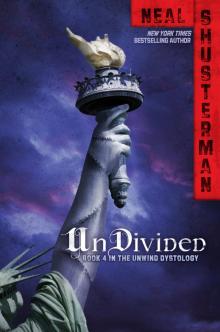 UnDivided
UnDivided UnBound
UnBound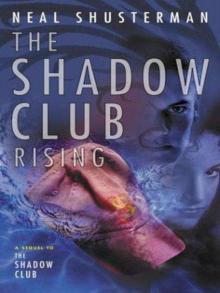 The Shadow Club Rising
The Shadow Club Rising Scorpion Shards
Scorpion Shards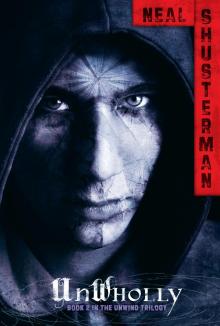 UnWholly
UnWholly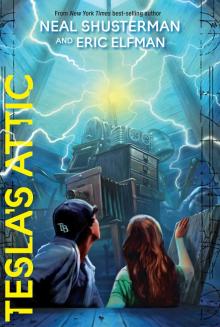 Tesla's Attic
Tesla's Attic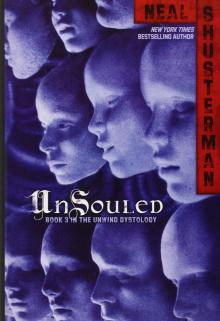 UnSouled
UnSouled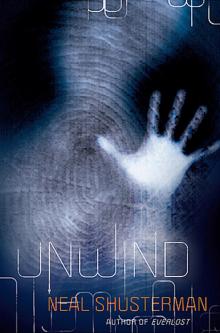 Unwind
Unwind Violent Ends
Violent Ends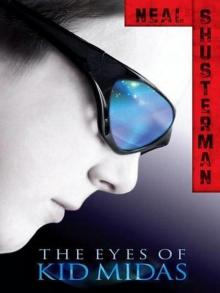 The Eyes of Kid Midas
The Eyes of Kid Midas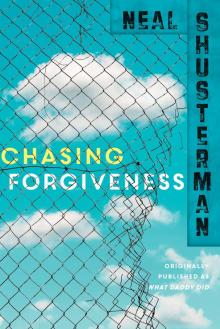 Chasing Forgiveness
Chasing Forgiveness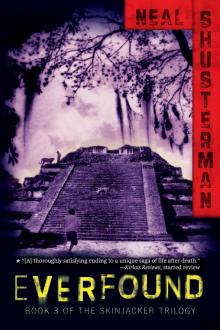 Everfound
Everfound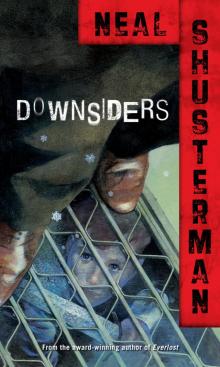 Downsiders
Downsiders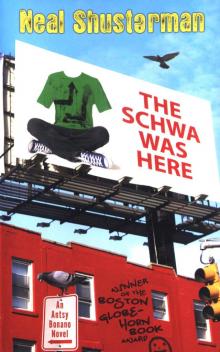 The Schwa Was Here
The Schwa Was Here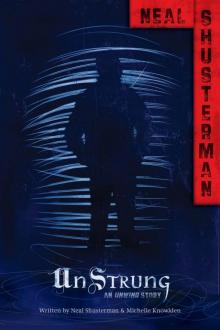 UnStrung
UnStrung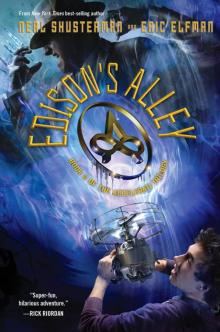 Edison's Alley
Edison's Alley Duckling Ugly
Duckling Ugly Everlost
Everlost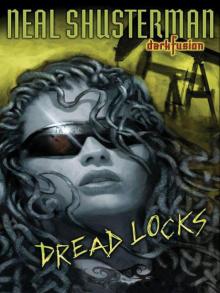 Dread Locks
Dread Locks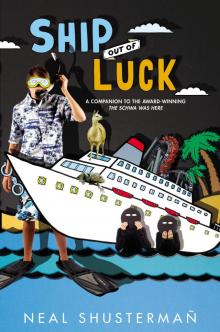 Antsy Floats
Antsy Floats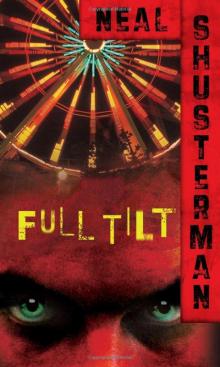 Full Tilt
Full Tilt Thunderhead
Thunderhead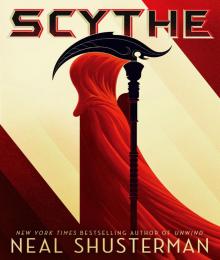 Scythe
Scythe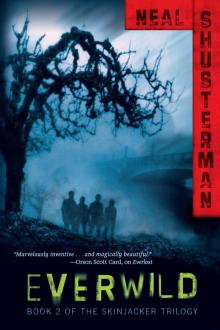 Everwild
Everwild Challenger Deep
Challenger Deep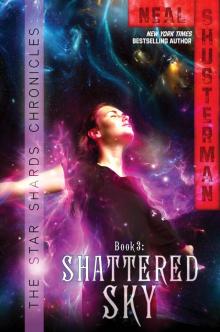 Shattered Sky
Shattered Sky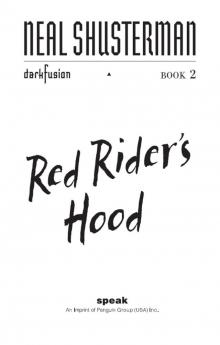 Red Rider's Hood
Red Rider's Hood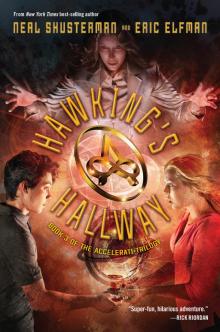 Hawking's Hallway
Hawking's Hallway Antsy Does Time
Antsy Does Time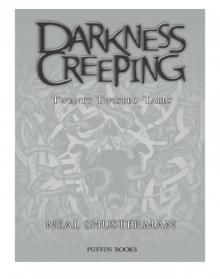 Darkness Creeping: Twenty Twisted Tales
Darkness Creeping: Twenty Twisted Tales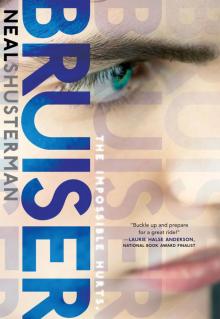 Bruiser
Bruiser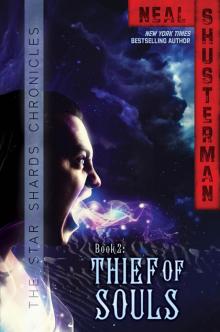 Thief of Souls
Thief of Souls The Toll
The Toll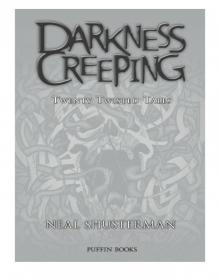 Darkness Creeping
Darkness Creeping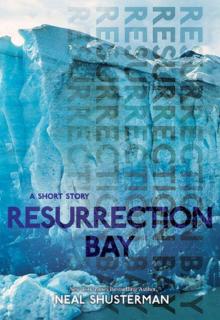 Resurrection Bay
Resurrection Bay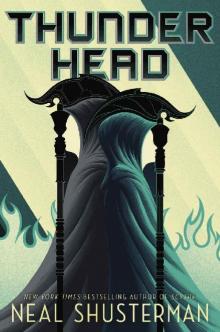 Thunderhead (Arc of a Scythe Book 2)
Thunderhead (Arc of a Scythe Book 2)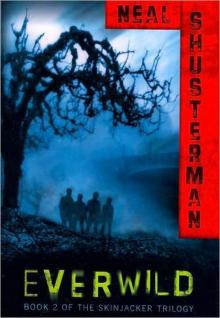 Everwild (The Skinjacker Trilogy)
Everwild (The Skinjacker Trilogy)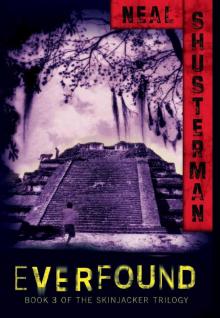 Everfound s-3
Everfound s-3 Edison’s Alley
Edison’s Alley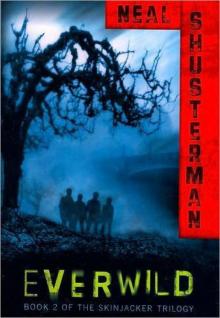 Everwild s-2
Everwild s-2 Dry
Dry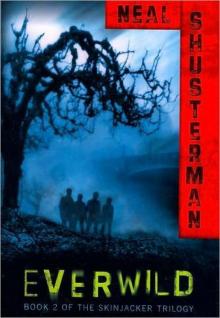 Skinjacker 02 Everwild
Skinjacker 02 Everwild Everlost s-1
Everlost s-1